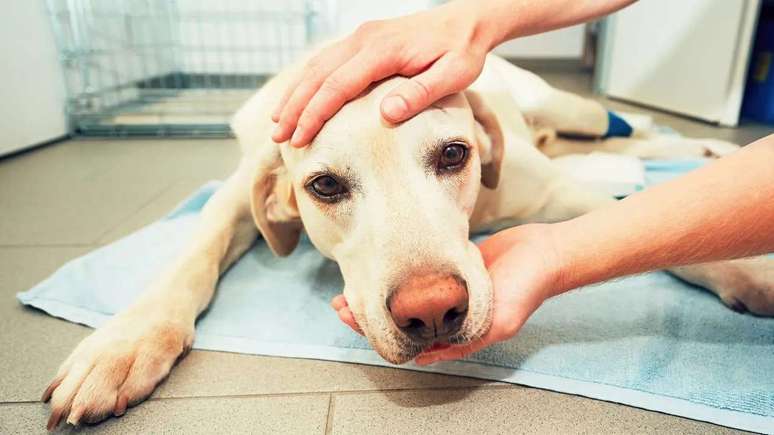The veterinarian lists treatments that help ensure pets receive adequate support during this difficult period
THE cancer in petsas occurs in humans, it is a condition characterized by the uncontrolled growth of abnormal cells in the body. This growth can lead to the formation of tumors, which are masses of cells, and, in some cases, invasion of adjacent tissues and organs.
The disease can be caused by several factors, including genetic predisposition, viral infections, radiation and chronic inflammation. Tumor cells have specific characteristics that differentiate them from normal cells. They divide without normal control mechanisms, ignoring the signals that usually regulate the cell cycle.
“Additionally, they prevent programmed cell death (apoptosis), which means that unlike normal cells that destroy themselves when they are damaged or no longer needed, cancer cells often escape this process,” explains Pamela Pioli Meneghesso, MD – Veterinary Product Manager at Avert Saúde Animal,
Another important characteristic of cancer in pets is the capacity for invasion and metastasis, in which cancer cells can invade nearby tissues and spread to other parts of the body through the bloodstream or lymphatic system, forming new tumors in distant locations .
To help owners ensure the well-being of pets suffering from cancer, the professional presents the essential treatments to deal with the disease.
Regular consultation with your veterinarian
The first and most important measure to take is to ensure regular veterinary monitoring. Cancer treatment may include chemotherapy, radiation therapy, or surgery, and each of these options requires constant monitoring to evaluate response to treatment and adjust doses as needed. Periodic consultations allow your veterinarian to quickly identify any side effects or complications.
Post-operative care
Treatment of cancers often begins with surgery to remove the tumor. In this case it is necessary to follow the veterinarian’s instructions to manage the surgical wound with dressing and daily cleaning. The use of post-surgical dressings designed for pets is also recommended as they ensure speed, efficiency and safety in the healing process, as well as protecting the wound.
Correct nutrition
Nutrition plays an important role in maintaining your pet’s health during treatment. A balanced diet adapted to the animal’s needs can strengthen the immune system and promote healing. Often, animals undergoing treatment may experience loss of appetite or nausea. Therefore, it is important to consult the professional responsible for your treatment on the best diet, which may include specific foods or supplements. There are also foods formulated specifically for pets with cancer.
Supplementation
Pets undergoing cancer treatment often face compromised immune systems, making supplementation an important strategy to help boost your dog or cat’s immunity and improve resistance. Beta-glucans, for example, play an important role in modulating the immune system, helping to strengthen the body’s natural defenses.
In addition to promoting a more effective immune response, beta-glucans can help combat side effects associated with cancer treatment, such as fatigue and inflammation, contributing to a better quality of life for animals during the therapeutic process.
Another option is omega-3 fatty acids, which have anti-inflammatory properties that can help with treatment. Finally, the inclusion of synbiotics in the diet can benefit intestinal health, especially in animals that take antibiotics or have a weakened immune system, helping to balance the intestinal microbiota and, therefore, promote recovery.
Hydration
Keeping your pet well hydrated is essential, as dehydration can cause further complications. It is important to constantly provide fresh, clean water. If your pet has difficulty drinking, consider offering water in different containers, adding it to food, or providing wet food.
Stress control
Animals undergoing treatment may become more sensitive to stress, so it is important to create a safe and relaxing space. Providing a soft bed in a quiet, comfortable place to rest and ensuring he has access to his favorite toys can help reduce anxiety and promote well-being.
Additionally, short walks and gentle play help maintain mobility and can improve your pet’s mood. However, it is essential to respect your pet’s limits and not force him to do more exercise than he can handle.
Be careful of side effects
Cancer treatments can cause side effects such as vomiting, diarrhea, hair loss, and lethargy. It is essential to observe your pet and report any changes to your veterinarian. Depending on the severity of the effects, the professional may change medications or suggest additional treatments to relieve symptoms.
Emotional support
Emotional support is essential when treating a pet with cancer. Giving attention and affection is one of the most important ways to offer comfort to the animal. The owner can spend quality time with the animal, offering hugs and moments of interaction, this helps strengthen the bond between them and provides greater security to the animal.
Source: Terra
Ben Stock is a lifestyle journalist and author at Gossipify. He writes about topics such as health, wellness, travel, food and home decor. He provides practical advice and inspiration to improve well-being, keeps readers up to date with latest lifestyle news and trends, known for his engaging writing style, in-depth analysis and unique perspectives.



-t8431tbjr50x.jpg)




